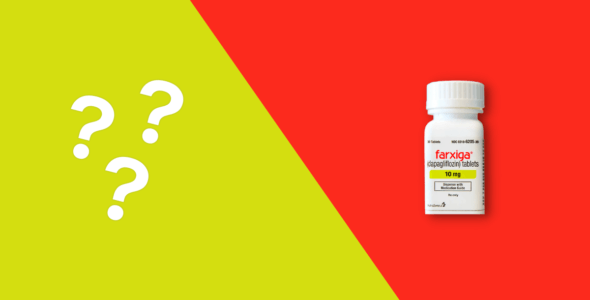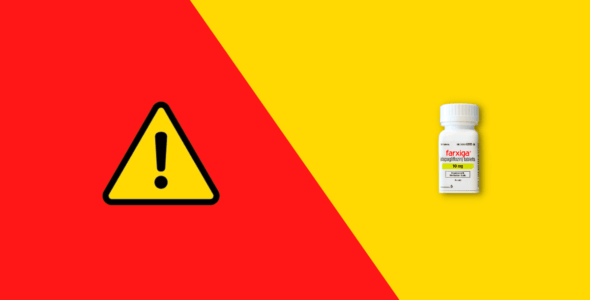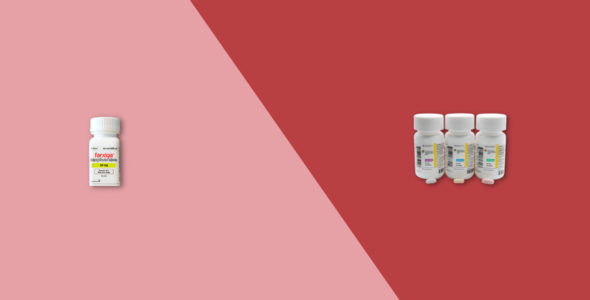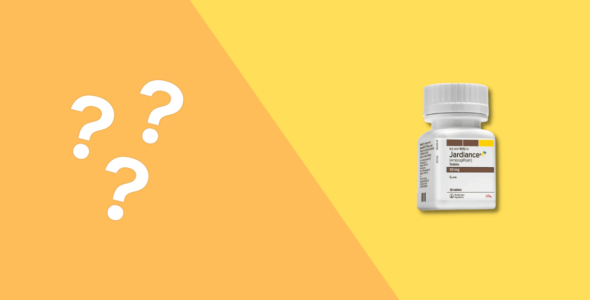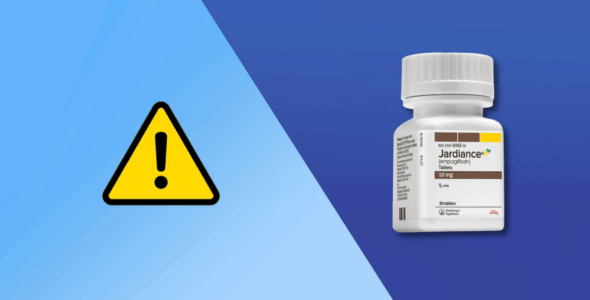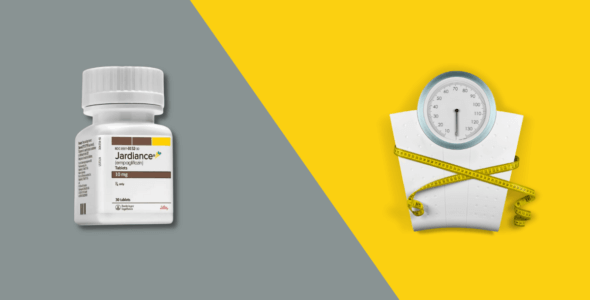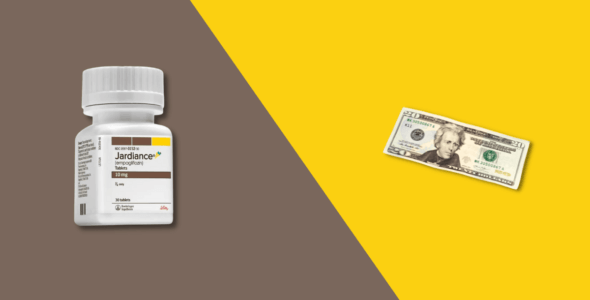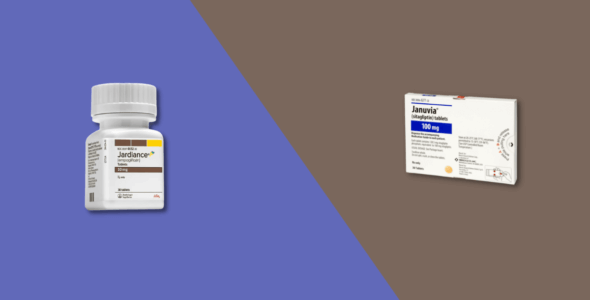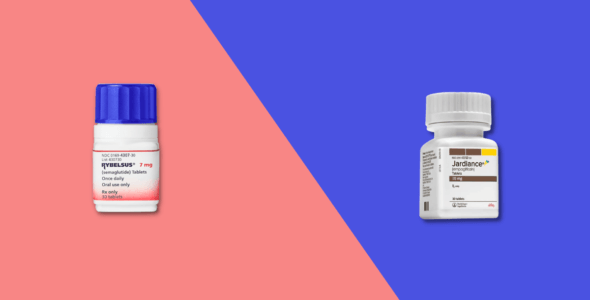Farxiga and Jardiance are brand names for prescription drugs used for the treatment of high blood sugar levels in people with type 2 diabetes. Both Jardiance and Farxiga are diabetes drugs that belong to a drug class known as sodium-glucose co-transporter 2 inhibitors (SGLT2 inhibitors).
Here we will explain how they work, their similarities and differences, their side effects, and more. This should provide you with the basics to better understand your options.
What is Farxiga?
Farxiga is an FDA (U.S. Food and Drug Administration) approved medication manufactured by AstraZeneca. It is used to lower blood sugar levels in people who have type 2 diabetes. It is also used in adults with chronic kidney disease (CKD), Type 2 diabetes, and heart failure.
Patients with diabetes struggle to maintain a normal blood sugar level. When they digest food, sugar is then released into the blood and their bodies don’t absorb it as well as they should. This can lead to high levels of blood sugar, which can cause a range of health problems over time.
Farxiga is used alongside exercise and changes in diet to manage blood sugar. It helps to remove excess blood sugar through urine. The medication can be used in combination with some other diabetes medications too, including insulin, metformin, or sulfonylureas.
The active ingredient in Farxiga is called dapagliflozin. When absorbed into your bloodstream, dapagliflozin slows down the rate at which your kidneys absorb sugar from your blood. This causes your kidneys to release sugar into your urine. Your blood sugar levels then fall as you urinate.
Farxiga dosage
Farxiga is available in tablet form, in the following doses: 5 mg and 10 mg.
For Type 2 Diabetes mellitus the recommended starting dose is 5 mg once daily, in the morning. Increase the dose to 10 mg once daily in patients tolerating 5 mg who require additional control.
To reduce the risk of hospitalization for heart failure in adults with type 2 diabetes mellitus and established cardiovascular disease or multiple cardiovascular risk factors, the recommended dose is 10 mg once daily.
What is Jardiance?
Jardiance is an FDA (U.S. Food and Drug Administration) approved medication manufactured by Boehringer Ingelheim Pharmaceuticals, Inc. Jardiance is also a diabetes medicine prescribed to adults with type 2 diabetes. It’s used to reduce blood sugar levels when used alongside exercise and diet changes, and to reduce the risk of death by heart disease.
- In combination with diet and exercise to improve glycemic control in adults with type 2 diabetes mellitus
- To reduce the risk of cardiovascular death in adults with type 2 diabetes mellitus and established cardiovascular disease
- To reduce the risk of cardiovascular death plus hospitalization for heart failure in adults with heart failure and reduced ejection fraction
Jardiance can help you lower your blood glucose levels when taken alongside dietary and lifestyle changes. It causes you to excrete more sugar in your urine than you would normally. This lowers your blood sugar and helps to reduce your risk of health conditions like cardiovascular disease.
The active ingredient in Jardiance is called empagliflozin. It lowers your blood sugar levels by causing you to lose more sugar in your urine than you usually would. Your kidneys help recycle sugar back into your blood from your urine, with the help of a protein called SGLT-2. Empagliflozin blocks this protein from working, reducing how much sugar your kidneys recycle. This makes you lose more sugar in your urine, rather than it being excreted back into your blood.
Jardiance dosage
Jardiance is available in tablet form, in the following doses: 10 mg, and 25 mg. The recommended dose of Jardiance is 10 mg once daily, in the morning, with or without food.
Common side effects of Farxiga and Jardiance
The most common side effects of Farxiga in clinical trials compared to placebo include:
- Dehydration
- Changes in urination
- Dizziness
- Back pain
- Yeast infection of the vagina or penis
- Weight loss
More serious side effects of Farxiga include:
- Low blood sugar (hypoglycemia)
- More serious urinary tract infections
- Inflammation of the pancreas
- Diabetic ketoacidosis
- Necrotizing fasciitis
The most common side effects of Jardiance in clinical trials compared to placebo include:
- Genital yeast infections in both men and women
- Needing to urinate more often and urinating more than usual
- Feeling more thirsty than usual
- Itching
- A skin rash – this may be itchy and include raised bumps and blisters that leak fluid, and may cause your skin to redden
- An increase in cholesterol levels
More serious side effects of Jardiance include
- Severe allergic reactions to the medication
- Low blood pressure (hypotension)
- A rare but serious bacterial infection that damages tissue under the skin (necrotizing fasciitis) in the area between the anus and genitals (perineum)
- Diabetic ketoacidosis
- Hypoglycemia
- An increased risk of serious urinary tract infections
- Increased risk of bone fracture
- A high and potentially harmful increase in your cholesterol levels
- Dehydration
These aren’t all the side effects Farxiga or Jardiance can cause. You can find more details in the patient leaflet that comes with your medication. If you have any concerns about side effects, talk to your physician or pharmacist.
Farxiga and Jardiance drug interactions
Farxiga can interact with other medications. These include:
- Any other diabetes medications, like insulin or sulfonylureas
- Diuretics
- Corticosteroids
- Estrogens
- Oral contraceptives
- Nicotinic acid
- Calcium channel blocking drugs
- Rifampin
Jardiance can interact with other medications. These include:
- Any other diabetes medications, like insulin or sulfonylureas
- Diuretics
- Corticosteroids
- Estrogens
- Oral contraceptives
- Nicotinic acid
- Calcium channel blocking drugs
- Rifampin
Farxiga and Jardiance can interact with other medications. This can change how Farxiga and Jardiance and other medications work and can make side effects more likely. Tell your prescribing physician about all your drugs, including vitamins and dietary supplements.
Farxiga and Jardiance contraindications
You should not use Farxiga if you:
- Are allergic to the active ingredient dapagliflozin
- Are allergic to any of the other ingredients found in Farxiga
- Have diabetic ketoacidosis or a history of diabetic ketoacidosis
- Have severe kidney problems or are on dialysis
- Are under 18 years of age
- Are pregnant or are planning to become pregnant
- Are breastfeeding or are planning to breastfeed
Talk to your doctor before using Farxiga if you:
- Have Type 1 diabetes
- Have renal or hepatic problems
- Have heart disease
- Have an intolerance to any sugars
- Are over 65 years of age
- Are taking medication to lower your blood pressure or have a history of low blood pressure
- Often get urinary tract infections
- Are going to have surgery
You should not use Jardiance if you:
- Are allergic to the active ingredient empagliflozin
- Are allergic to any of the other ingredients in Jardiance
- Have Type 1 diabetes (Jardiance is for type 2 diabetes only)
- Are under 18 years of age
Talk to your doctor before using Jardiance if you:
- Have problems with liver or kidney function
- Have or have ever had problems with your pancreas, like pancreatitis or surgery on your pancreas
- Have a history of urinary tract infections or any problems with urination
- Often drink alcohol, or drink a lot of alcohol in a short period of time
- Are going to have surgery in the near future
- Are eating less than usual or have changed your diet
- Are pregnant or are planning to become pregnant
- Are breastfeeding or are planning to breastfeed
Other drugs for type 2 diabetes
If you have any concerns about Farxiga or Jardiance side effects, talk to your physician, or pharmacist for medical advice. Also inform your healthcare provider about any medical conditions, supplements, and over-the-counter meds you are taking. You are also encouraged to report side effects to the FDA: visit http://www.fda.gov/medwatch or call 1-800-FDA-1088.
